The Evolving Role of Clinical Nurse Specialists in Modern Healthcare
VerifiedAdded on 2023/04/04
|13
|3156
|165
Essay
AI Summary
This essay provides a comprehensive overview of the role of Clinical Nurse Specialists (CNS) in healthcare, focusing on their responsibilities in clinical practice, consultation, research, management, and teaching. It discusses the standards of practice and qualifications associated with this role both nationally and internationally, with specific examples from the United Kingdom, Canada, New Zealand, and Australia. A critical analysis is presented on the CNS role in diabetes care, highlighting their involvement in patient education, management, and collaboration with other healthcare professionals. The essay also examines the impact of CNS roles in the workplace, emphasizing their contribution to streamlining patient care, making treatment decisions, and enhancing staff cooperation. The four main standards of practice associated with the role of these specialists are thoroughly explained, including assessment, care planning, therapeutic implementation, and outcome evaluation. The essay concludes by critically analyzing the role of the clinical nurse specialist in a workplace setting, underlining their expertise in evidence-based nursing practice and their focus on improving patient and population health outcomes. Desklib provides similar solved assignments for students.
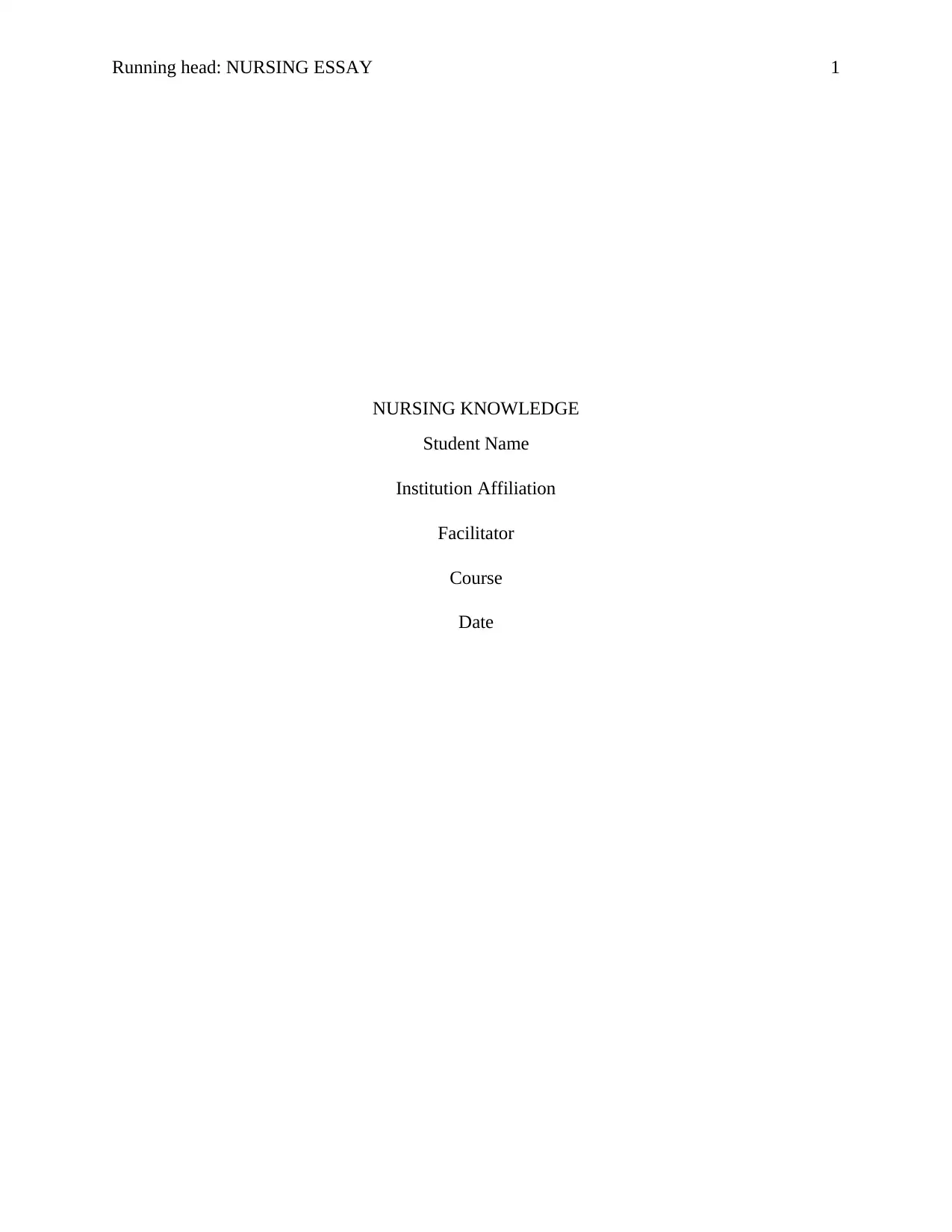
Running head: NURSING ESSAY 1
NURSING KNOWLEDGE
Student Name
Institution Affiliation
Facilitator
Course
Date
NURSING KNOWLEDGE
Student Name
Institution Affiliation
Facilitator
Course
Date
Paraphrase This Document
Need a fresh take? Get an instant paraphrase of this document with our AI Paraphraser
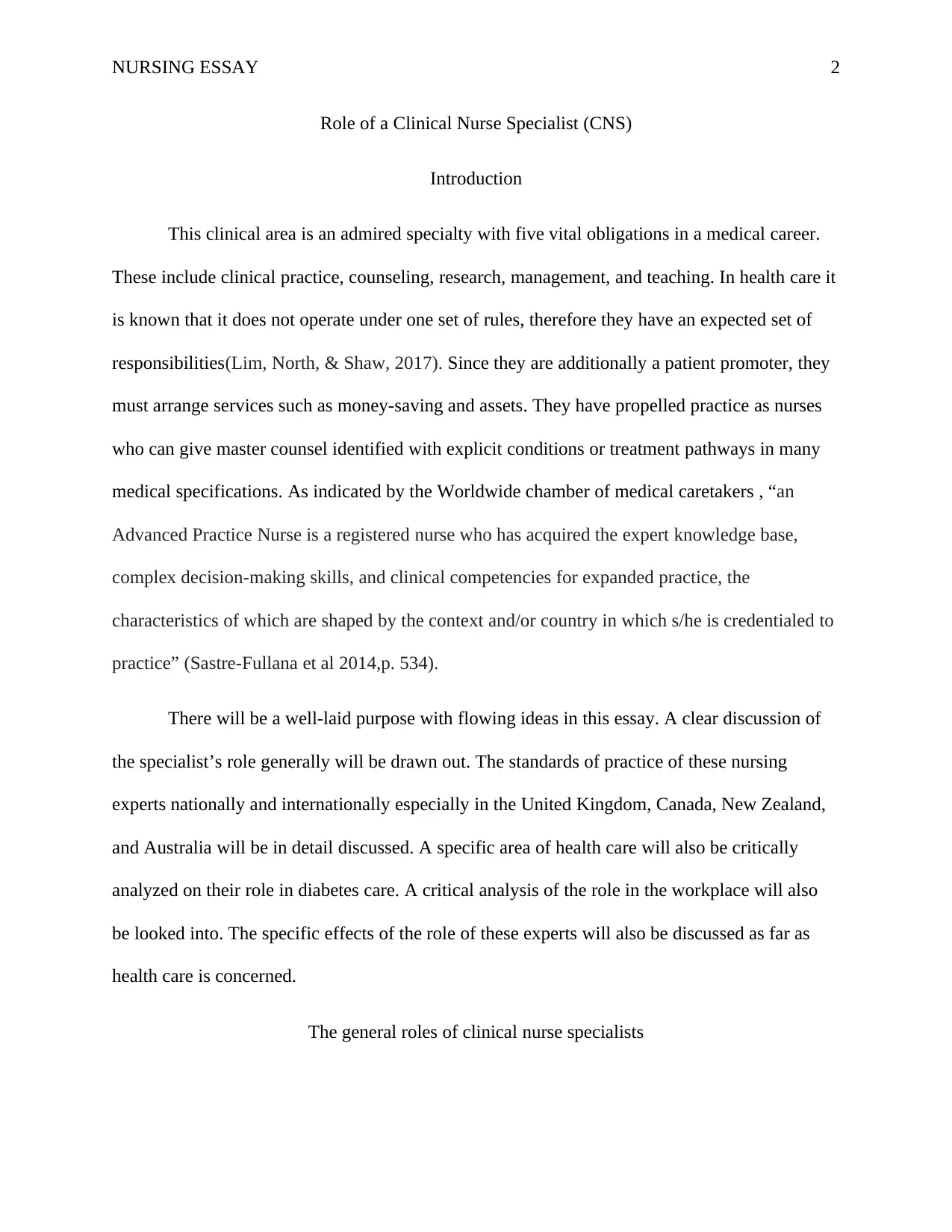
NURSING ESSAY 2
Role of a Clinical Nurse Specialist (CNS)
Introduction
This clinical area is an admired specialty with five vital obligations in a medical career.
These include clinical practice, counseling, research, management, and teaching. In health care it
is known that it does not operate under one set of rules, therefore they have an expected set of
responsibilities(Lim, North, & Shaw, 2017). Since they are additionally a patient promoter, they
must arrange services such as money-saving and assets. They have propelled practice as nurses
who can give master counsel identified with explicit conditions or treatment pathways in many
medical specifications. As indicated by the Worldwide chamber of medical caretakers , “an
Advanced Practice Nurse is a registered nurse who has acquired the expert knowledge base,
complex decision-making skills, and clinical competencies for expanded practice, the
characteristics of which are shaped by the context and/or country in which s/he is credentialed to
practice” (Sastre‐Fullana et al 2014,p. 534).
There will be a well-laid purpose with flowing ideas in this essay. A clear discussion of
the specialist’s role generally will be drawn out. The standards of practice of these nursing
experts nationally and internationally especially in the United Kingdom, Canada, New Zealand,
and Australia will be in detail discussed. A specific area of health care will also be critically
analyzed on their role in diabetes care. A critical analysis of the role in the workplace will also
be looked into. The specific effects of the role of these experts will also be discussed as far as
health care is concerned.
The general roles of clinical nurse specialists
Role of a Clinical Nurse Specialist (CNS)
Introduction
This clinical area is an admired specialty with five vital obligations in a medical career.
These include clinical practice, counseling, research, management, and teaching. In health care it
is known that it does not operate under one set of rules, therefore they have an expected set of
responsibilities(Lim, North, & Shaw, 2017). Since they are additionally a patient promoter, they
must arrange services such as money-saving and assets. They have propelled practice as nurses
who can give master counsel identified with explicit conditions or treatment pathways in many
medical specifications. As indicated by the Worldwide chamber of medical caretakers , “an
Advanced Practice Nurse is a registered nurse who has acquired the expert knowledge base,
complex decision-making skills, and clinical competencies for expanded practice, the
characteristics of which are shaped by the context and/or country in which s/he is credentialed to
practice” (Sastre‐Fullana et al 2014,p. 534).
There will be a well-laid purpose with flowing ideas in this essay. A clear discussion of
the specialist’s role generally will be drawn out. The standards of practice of these nursing
experts nationally and internationally especially in the United Kingdom, Canada, New Zealand,
and Australia will be in detail discussed. A specific area of health care will also be critically
analyzed on their role in diabetes care. A critical analysis of the role in the workplace will also
be looked into. The specific effects of the role of these experts will also be discussed as far as
health care is concerned.
The general roles of clinical nurse specialists
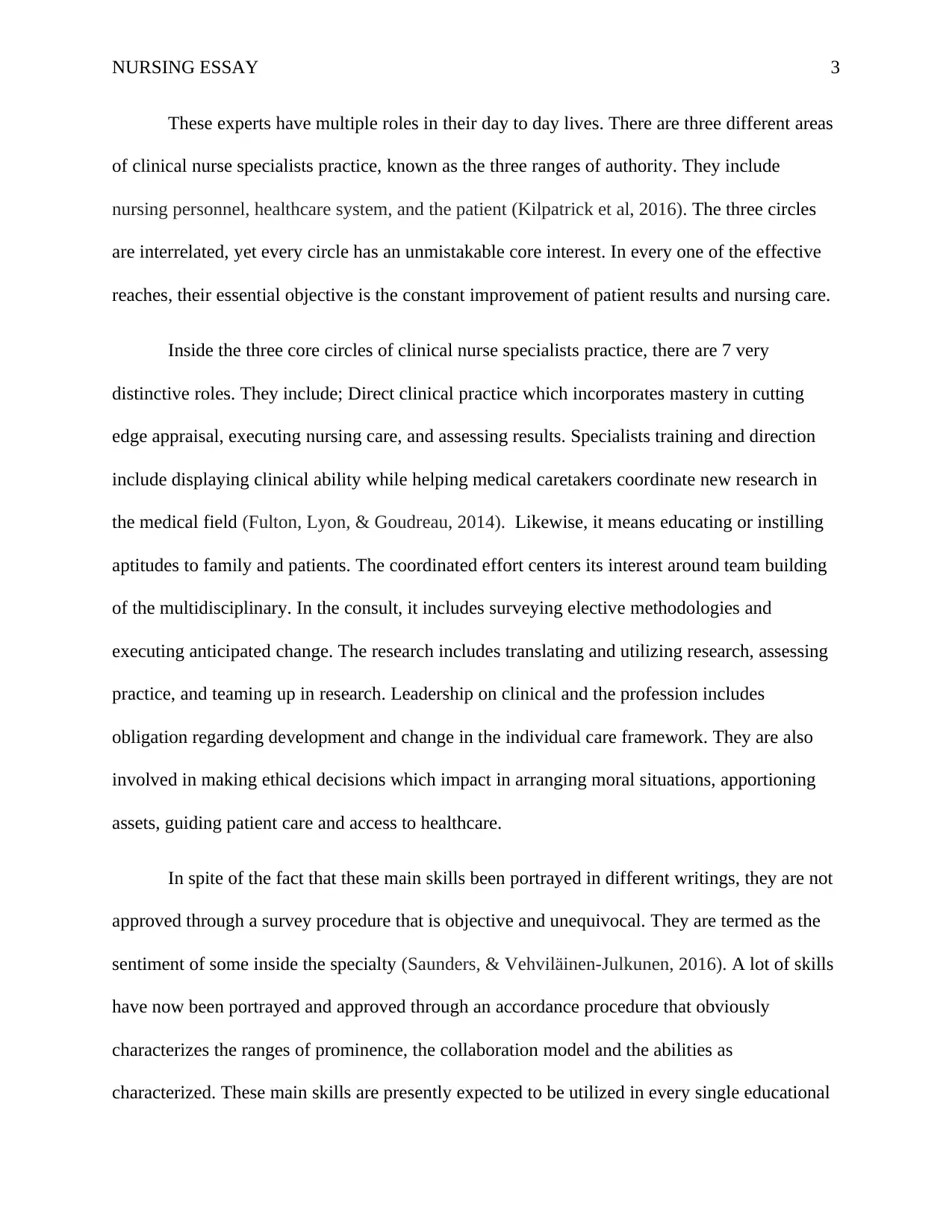
NURSING ESSAY 3
These experts have multiple roles in their day to day lives. There are three different areas
of clinical nurse specialists practice, known as the three ranges of authority. They include
nursing personnel, healthcare system, and the patient (Kilpatrick et al, 2016). The three circles
are interrelated, yet every circle has an unmistakable core interest. In every one of the effective
reaches, their essential objective is the constant improvement of patient results and nursing care.
Inside the three core circles of clinical nurse specialists practice, there are 7 very
distinctive roles. They include; Direct clinical practice which incorporates mastery in cutting
edge appraisal, executing nursing care, and assessing results. Specialists training and direction
include displaying clinical ability while helping medical caretakers coordinate new research in
the medical field (Fulton, Lyon, & Goudreau, 2014). Likewise, it means educating or instilling
aptitudes to family and patients. The coordinated effort centers its interest around team building
of the multidisciplinary. In the consult, it includes surveying elective methodologies and
executing anticipated change. The research includes translating and utilizing research, assessing
practice, and teaming up in research. Leadership on clinical and the profession includes
obligation regarding development and change in the individual care framework. They are also
involved in making ethical decisions which impact in arranging moral situations, apportioning
assets, guiding patient care and access to healthcare.
In spite of the fact that these main skills been portrayed in different writings, they are not
approved through a survey procedure that is objective and unequivocal. They are termed as the
sentiment of some inside the specialty (Saunders, & Vehviläinen-Julkunen, 2016). A lot of skills
have now been portrayed and approved through an accordance procedure that obviously
characterizes the ranges of prominence, the collaboration model and the abilities as
characterized. These main skills are presently expected to be utilized in every single educational
These experts have multiple roles in their day to day lives. There are three different areas
of clinical nurse specialists practice, known as the three ranges of authority. They include
nursing personnel, healthcare system, and the patient (Kilpatrick et al, 2016). The three circles
are interrelated, yet every circle has an unmistakable core interest. In every one of the effective
reaches, their essential objective is the constant improvement of patient results and nursing care.
Inside the three core circles of clinical nurse specialists practice, there are 7 very
distinctive roles. They include; Direct clinical practice which incorporates mastery in cutting
edge appraisal, executing nursing care, and assessing results. Specialists training and direction
include displaying clinical ability while helping medical caretakers coordinate new research in
the medical field (Fulton, Lyon, & Goudreau, 2014). Likewise, it means educating or instilling
aptitudes to family and patients. The coordinated effort centers its interest around team building
of the multidisciplinary. In the consult, it includes surveying elective methodologies and
executing anticipated change. The research includes translating and utilizing research, assessing
practice, and teaming up in research. Leadership on clinical and the profession includes
obligation regarding development and change in the individual care framework. They are also
involved in making ethical decisions which impact in arranging moral situations, apportioning
assets, guiding patient care and access to healthcare.
In spite of the fact that these main skills been portrayed in different writings, they are not
approved through a survey procedure that is objective and unequivocal. They are termed as the
sentiment of some inside the specialty (Saunders, & Vehviläinen-Julkunen, 2016). A lot of skills
have now been portrayed and approved through an accordance procedure that obviously
characterizes the ranges of prominence, the collaboration model and the abilities as
characterized. These main skills are presently expected to be utilized in every single educational
⊘ This is a preview!⊘
Do you want full access?
Subscribe today to unlock all pages.

Trusted by 1+ million students worldwide
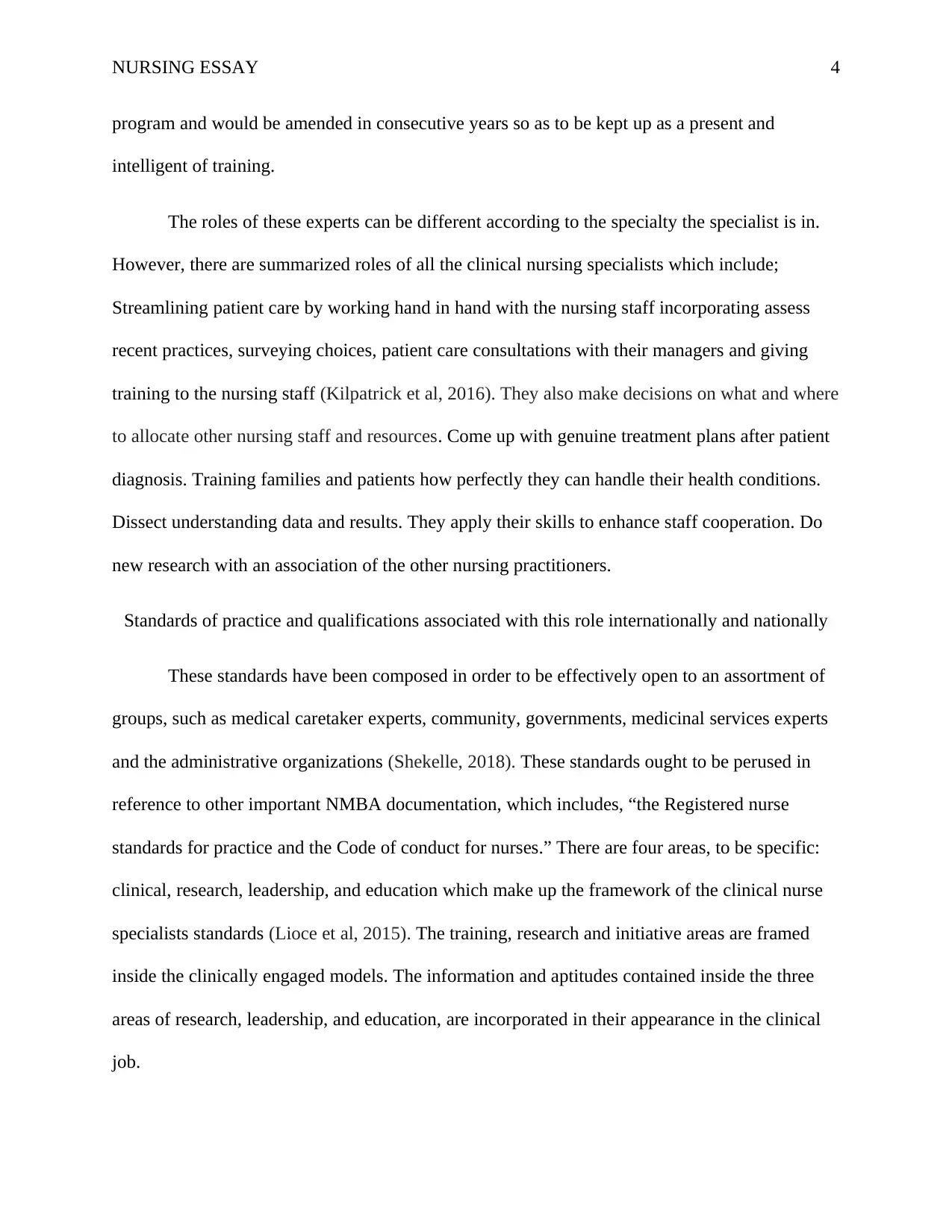
NURSING ESSAY 4
program and would be amended in consecutive years so as to be kept up as a present and
intelligent of training.
The roles of these experts can be different according to the specialty the specialist is in.
However, there are summarized roles of all the clinical nursing specialists which include;
Streamlining patient care by working hand in hand with the nursing staff incorporating assess
recent practices, surveying choices, patient care consultations with their managers and giving
training to the nursing staff (Kilpatrick et al, 2016). They also make decisions on what and where
to allocate other nursing staff and resources. Come up with genuine treatment plans after patient
diagnosis. Training families and patients how perfectly they can handle their health conditions.
Dissect understanding data and results. They apply their skills to enhance staff cooperation. Do
new research with an association of the other nursing practitioners.
Standards of practice and qualifications associated with this role internationally and nationally
These standards have been composed in order to be effectively open to an assortment of
groups, such as medical caretaker experts, community, governments, medicinal services experts
and the administrative organizations (Shekelle, 2018). These standards ought to be perused in
reference to other important NMBA documentation, which includes, “the Registered nurse
standards for practice and the Code of conduct for nurses.” There are four areas, to be specific:
clinical, research, leadership, and education which make up the framework of the clinical nurse
specialists standards (Lioce et al, 2015). The training, research and initiative areas are framed
inside the clinically engaged models. The information and aptitudes contained inside the three
areas of research, leadership, and education, are incorporated in their appearance in the clinical
job.
program and would be amended in consecutive years so as to be kept up as a present and
intelligent of training.
The roles of these experts can be different according to the specialty the specialist is in.
However, there are summarized roles of all the clinical nursing specialists which include;
Streamlining patient care by working hand in hand with the nursing staff incorporating assess
recent practices, surveying choices, patient care consultations with their managers and giving
training to the nursing staff (Kilpatrick et al, 2016). They also make decisions on what and where
to allocate other nursing staff and resources. Come up with genuine treatment plans after patient
diagnosis. Training families and patients how perfectly they can handle their health conditions.
Dissect understanding data and results. They apply their skills to enhance staff cooperation. Do
new research with an association of the other nursing practitioners.
Standards of practice and qualifications associated with this role internationally and nationally
These standards have been composed in order to be effectively open to an assortment of
groups, such as medical caretaker experts, community, governments, medicinal services experts
and the administrative organizations (Shekelle, 2018). These standards ought to be perused in
reference to other important NMBA documentation, which includes, “the Registered nurse
standards for practice and the Code of conduct for nurses.” There are four areas, to be specific:
clinical, research, leadership, and education which make up the framework of the clinical nurse
specialists standards (Lioce et al, 2015). The training, research and initiative areas are framed
inside the clinically engaged models. The information and aptitudes contained inside the three
areas of research, leadership, and education, are incorporated in their appearance in the clinical
job.
Paraphrase This Document
Need a fresh take? Get an instant paraphrase of this document with our AI Paraphraser
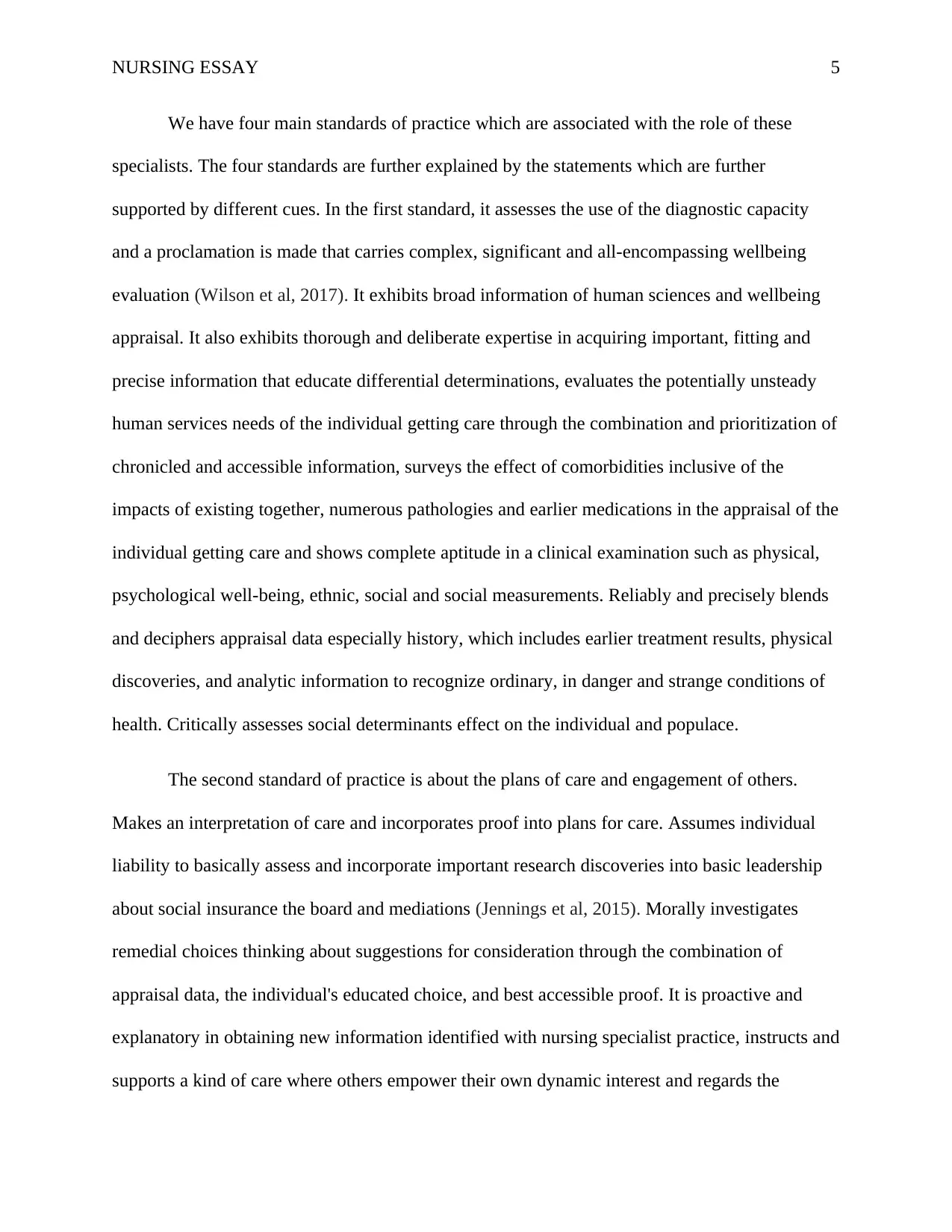
NURSING ESSAY 5
We have four main standards of practice which are associated with the role of these
specialists. The four standards are further explained by the statements which are further
supported by different cues. In the first standard, it assesses the use of the diagnostic capacity
and a proclamation is made that carries complex, significant and all-encompassing wellbeing
evaluation (Wilson et al, 2017). It exhibits broad information of human sciences and wellbeing
appraisal. It also exhibits thorough and deliberate expertise in acquiring important, fitting and
precise information that educate differential determinations, evaluates the potentially unsteady
human services needs of the individual getting care through the combination and prioritization of
chronicled and accessible information, surveys the effect of comorbidities inclusive of the
impacts of existing together, numerous pathologies and earlier medications in the appraisal of the
individual getting care and shows complete aptitude in a clinical examination such as physical,
psychological well-being, ethnic, social and social measurements. Reliably and precisely blends
and deciphers appraisal data especially history, which includes earlier treatment results, physical
discoveries, and analytic information to recognize ordinary, in danger and strange conditions of
health. Critically assesses social determinants effect on the individual and populace.
The second standard of practice is about the plans of care and engagement of others.
Makes an interpretation of care and incorporates proof into plans for care. Assumes individual
liability to basically assess and incorporate important research discoveries into basic leadership
about social insurance the board and mediations (Jennings et al, 2015). Morally investigates
remedial choices thinking about suggestions for consideration through the combination of
appraisal data, the individual's educated choice, and best accessible proof. It is proactive and
explanatory in obtaining new information identified with nursing specialist practice, instructs and
supports a kind of care where others empower their own dynamic interest and regards the
We have four main standards of practice which are associated with the role of these
specialists. The four standards are further explained by the statements which are further
supported by different cues. In the first standard, it assesses the use of the diagnostic capacity
and a proclamation is made that carries complex, significant and all-encompassing wellbeing
evaluation (Wilson et al, 2017). It exhibits broad information of human sciences and wellbeing
appraisal. It also exhibits thorough and deliberate expertise in acquiring important, fitting and
precise information that educate differential determinations, evaluates the potentially unsteady
human services needs of the individual getting care through the combination and prioritization of
chronicled and accessible information, surveys the effect of comorbidities inclusive of the
impacts of existing together, numerous pathologies and earlier medications in the appraisal of the
individual getting care and shows complete aptitude in a clinical examination such as physical,
psychological well-being, ethnic, social and social measurements. Reliably and precisely blends
and deciphers appraisal data especially history, which includes earlier treatment results, physical
discoveries, and analytic information to recognize ordinary, in danger and strange conditions of
health. Critically assesses social determinants effect on the individual and populace.
The second standard of practice is about the plans of care and engagement of others.
Makes an interpretation of care and incorporates proof into plans for care. Assumes individual
liability to basically assess and incorporate important research discoveries into basic leadership
about social insurance the board and mediations (Jennings et al, 2015). Morally investigates
remedial choices thinking about suggestions for consideration through the combination of
appraisal data, the individual's educated choice, and best accessible proof. It is proactive and
explanatory in obtaining new information identified with nursing specialist practice, instructs and
supports a kind of care where others empower their own dynamic interest and regards the
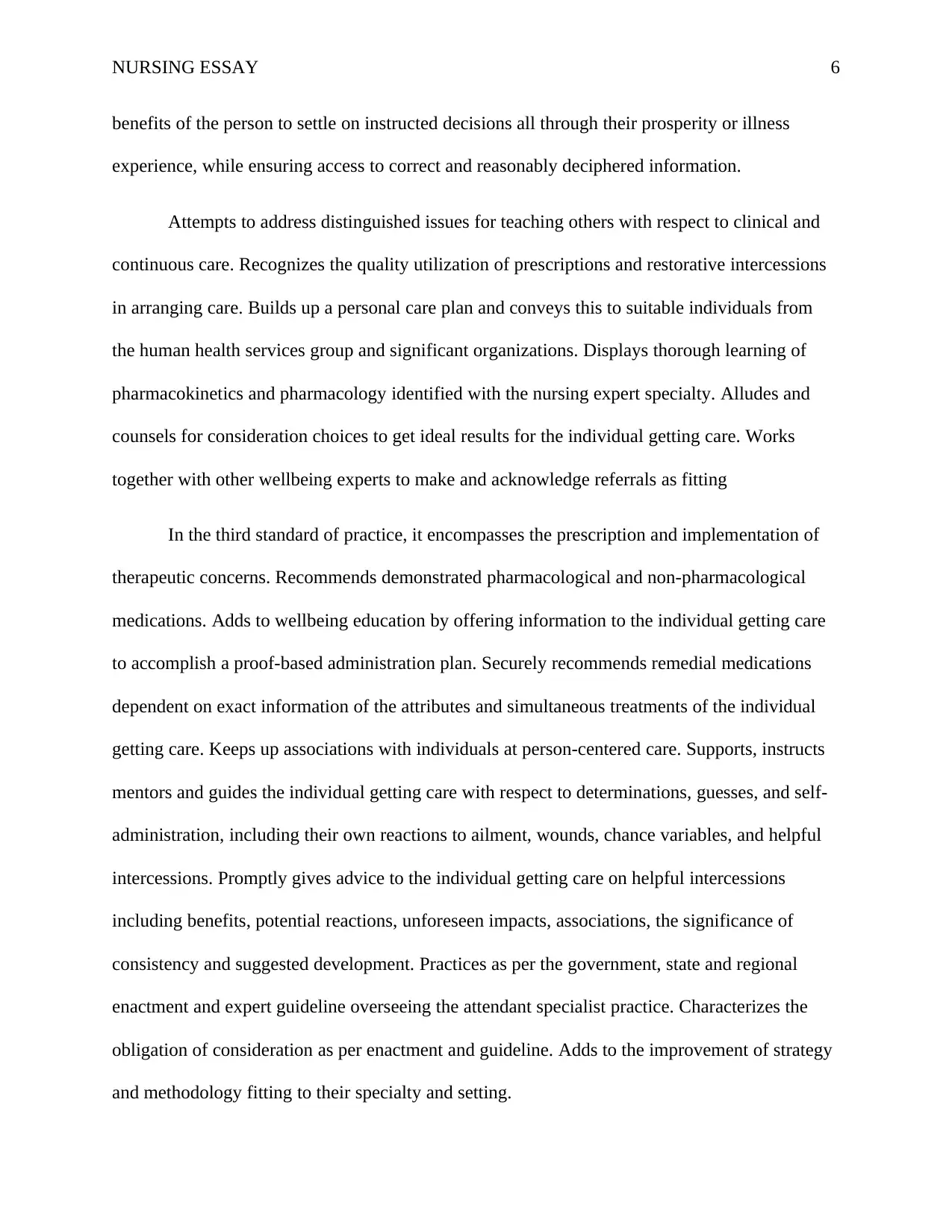
NURSING ESSAY 6
benefits of the person to settle on instructed decisions all through their prosperity or illness
experience, while ensuring access to correct and reasonably deciphered information.
Attempts to address distinguished issues for teaching others with respect to clinical and
continuous care. Recognizes the quality utilization of prescriptions and restorative intercessions
in arranging care. Builds up a personal care plan and conveys this to suitable individuals from
the human health services group and significant organizations. Displays thorough learning of
pharmacokinetics and pharmacology identified with the nursing expert specialty. Alludes and
counsels for consideration choices to get ideal results for the individual getting care. Works
together with other wellbeing experts to make and acknowledge referrals as fitting
In the third standard of practice, it encompasses the prescription and implementation of
therapeutic concerns. Recommends demonstrated pharmacological and non-pharmacological
medications. Adds to wellbeing education by offering information to the individual getting care
to accomplish a proof-based administration plan. Securely recommends remedial medications
dependent on exact information of the attributes and simultaneous treatments of the individual
getting care. Keeps up associations with individuals at person-centered care. Supports, instructs
mentors and guides the individual getting care with respect to determinations, guesses, and self-
administration, including their own reactions to ailment, wounds, chance variables, and helpful
intercessions. Promptly gives advice to the individual getting care on helpful intercessions
including benefits, potential reactions, unforeseen impacts, associations, the significance of
consistency and suggested development. Practices as per the government, state and regional
enactment and expert guideline overseeing the attendant specialist practice. Characterizes the
obligation of consideration as per enactment and guideline. Adds to the improvement of strategy
and methodology fitting to their specialty and setting.
benefits of the person to settle on instructed decisions all through their prosperity or illness
experience, while ensuring access to correct and reasonably deciphered information.
Attempts to address distinguished issues for teaching others with respect to clinical and
continuous care. Recognizes the quality utilization of prescriptions and restorative intercessions
in arranging care. Builds up a personal care plan and conveys this to suitable individuals from
the human health services group and significant organizations. Displays thorough learning of
pharmacokinetics and pharmacology identified with the nursing expert specialty. Alludes and
counsels for consideration choices to get ideal results for the individual getting care. Works
together with other wellbeing experts to make and acknowledge referrals as fitting
In the third standard of practice, it encompasses the prescription and implementation of
therapeutic concerns. Recommends demonstrated pharmacological and non-pharmacological
medications. Adds to wellbeing education by offering information to the individual getting care
to accomplish a proof-based administration plan. Securely recommends remedial medications
dependent on exact information of the attributes and simultaneous treatments of the individual
getting care. Keeps up associations with individuals at person-centered care. Supports, instructs
mentors and guides the individual getting care with respect to determinations, guesses, and self-
administration, including their own reactions to ailment, wounds, chance variables, and helpful
intercessions. Promptly gives advice to the individual getting care on helpful intercessions
including benefits, potential reactions, unforeseen impacts, associations, the significance of
consistency and suggested development. Practices as per the government, state and regional
enactment and expert guideline overseeing the attendant specialist practice. Characterizes the
obligation of consideration as per enactment and guideline. Adds to the improvement of strategy
and methodology fitting to their specialty and setting.
⊘ This is a preview!⊘
Do you want full access?
Subscribe today to unlock all pages.

Trusted by 1+ million students worldwide
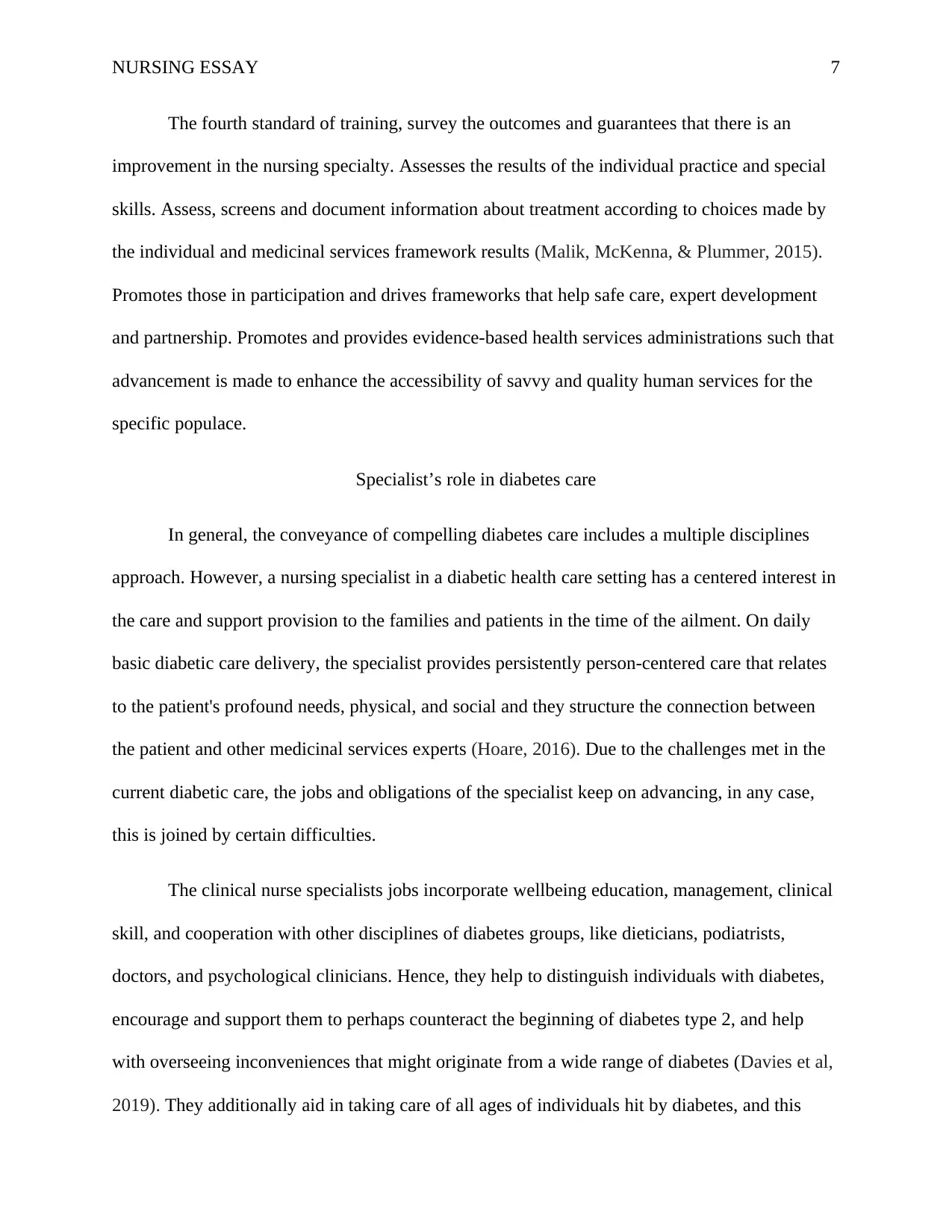
NURSING ESSAY 7
The fourth standard of training, survey the outcomes and guarantees that there is an
improvement in the nursing specialty. Assesses the results of the individual practice and special
skills. Assess, screens and document information about treatment according to choices made by
the individual and medicinal services framework results (Malik, McKenna, & Plummer, 2015).
Promotes those in participation and drives frameworks that help safe care, expert development
and partnership. Promotes and provides evidence-based health services administrations such that
advancement is made to enhance the accessibility of savvy and quality human services for the
specific populace.
Specialist’s role in diabetes care
In general, the conveyance of compelling diabetes care includes a multiple disciplines
approach. However, a nursing specialist in a diabetic health care setting has a centered interest in
the care and support provision to the families and patients in the time of the ailment. On daily
basic diabetic care delivery, the specialist provides persistently person-centered care that relates
to the patient's profound needs, physical, and social and they structure the connection between
the patient and other medicinal services experts (Hoare, 2016). Due to the challenges met in the
current diabetic care, the jobs and obligations of the specialist keep on advancing, in any case,
this is joined by certain difficulties.
The clinical nurse specialists jobs incorporate wellbeing education, management, clinical
skill, and cooperation with other disciplines of diabetes groups, like dieticians, podiatrists,
doctors, and psychological clinicians. Hence, they help to distinguish individuals with diabetes,
encourage and support them to perhaps counteract the beginning of diabetes type 2, and help
with overseeing inconveniences that might originate from a wide range of diabetes (Davies et al,
2019). They additionally aid in taking care of all ages of individuals hit by diabetes, and this
The fourth standard of training, survey the outcomes and guarantees that there is an
improvement in the nursing specialty. Assesses the results of the individual practice and special
skills. Assess, screens and document information about treatment according to choices made by
the individual and medicinal services framework results (Malik, McKenna, & Plummer, 2015).
Promotes those in participation and drives frameworks that help safe care, expert development
and partnership. Promotes and provides evidence-based health services administrations such that
advancement is made to enhance the accessibility of savvy and quality human services for the
specific populace.
Specialist’s role in diabetes care
In general, the conveyance of compelling diabetes care includes a multiple disciplines
approach. However, a nursing specialist in a diabetic health care setting has a centered interest in
the care and support provision to the families and patients in the time of the ailment. On daily
basic diabetic care delivery, the specialist provides persistently person-centered care that relates
to the patient's profound needs, physical, and social and they structure the connection between
the patient and other medicinal services experts (Hoare, 2016). Due to the challenges met in the
current diabetic care, the jobs and obligations of the specialist keep on advancing, in any case,
this is joined by certain difficulties.
The clinical nurse specialists jobs incorporate wellbeing education, management, clinical
skill, and cooperation with other disciplines of diabetes groups, like dieticians, podiatrists,
doctors, and psychological clinicians. Hence, they help to distinguish individuals with diabetes,
encourage and support them to perhaps counteract the beginning of diabetes type 2, and help
with overseeing inconveniences that might originate from a wide range of diabetes (Davies et al,
2019). They additionally aid in taking care of all ages of individuals hit by diabetes, and this
Paraphrase This Document
Need a fresh take? Get an instant paraphrase of this document with our AI Paraphraser
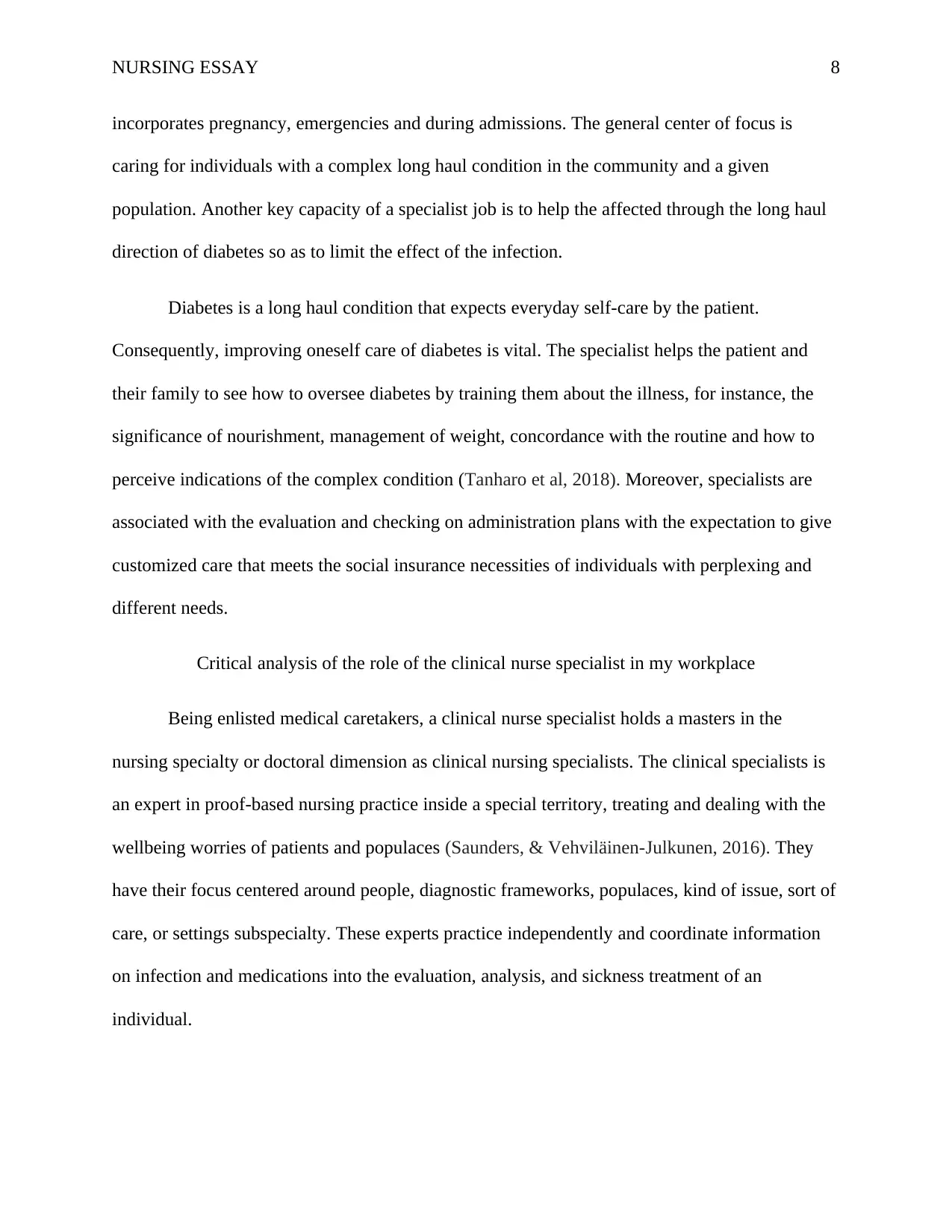
NURSING ESSAY 8
incorporates pregnancy, emergencies and during admissions. The general center of focus is
caring for individuals with a complex long haul condition in the community and a given
population. Another key capacity of a specialist job is to help the affected through the long haul
direction of diabetes so as to limit the effect of the infection.
Diabetes is a long haul condition that expects everyday self-care by the patient.
Consequently, improving oneself care of diabetes is vital. The specialist helps the patient and
their family to see how to oversee diabetes by training them about the illness, for instance, the
significance of nourishment, management of weight, concordance with the routine and how to
perceive indications of the complex condition (Tanharo et al, 2018). Moreover, specialists are
associated with the evaluation and checking on administration plans with the expectation to give
customized care that meets the social insurance necessities of individuals with perplexing and
different needs.
Critical analysis of the role of the clinical nurse specialist in my workplace
Being enlisted medical caretakers, a clinical nurse specialist holds a masters in the
nursing specialty or doctoral dimension as clinical nursing specialists. The clinical specialists is
an expert in proof-based nursing practice inside a special territory, treating and dealing with the
wellbeing worries of patients and populaces (Saunders, & Vehviläinen-Julkunen, 2016). They
have their focus centered around people, diagnostic frameworks, populaces, kind of issue, sort of
care, or settings subspecialty. These experts practice independently and coordinate information
on infection and medications into the evaluation, analysis, and sickness treatment of an
individual.
incorporates pregnancy, emergencies and during admissions. The general center of focus is
caring for individuals with a complex long haul condition in the community and a given
population. Another key capacity of a specialist job is to help the affected through the long haul
direction of diabetes so as to limit the effect of the infection.
Diabetes is a long haul condition that expects everyday self-care by the patient.
Consequently, improving oneself care of diabetes is vital. The specialist helps the patient and
their family to see how to oversee diabetes by training them about the illness, for instance, the
significance of nourishment, management of weight, concordance with the routine and how to
perceive indications of the complex condition (Tanharo et al, 2018). Moreover, specialists are
associated with the evaluation and checking on administration plans with the expectation to give
customized care that meets the social insurance necessities of individuals with perplexing and
different needs.
Critical analysis of the role of the clinical nurse specialist in my workplace
Being enlisted medical caretakers, a clinical nurse specialist holds a masters in the
nursing specialty or doctoral dimension as clinical nursing specialists. The clinical specialists is
an expert in proof-based nursing practice inside a special territory, treating and dealing with the
wellbeing worries of patients and populaces (Saunders, & Vehviläinen-Julkunen, 2016). They
have their focus centered around people, diagnostic frameworks, populaces, kind of issue, sort of
care, or settings subspecialty. These experts practice independently and coordinate information
on infection and medications into the evaluation, analysis, and sickness treatment of an
individual.
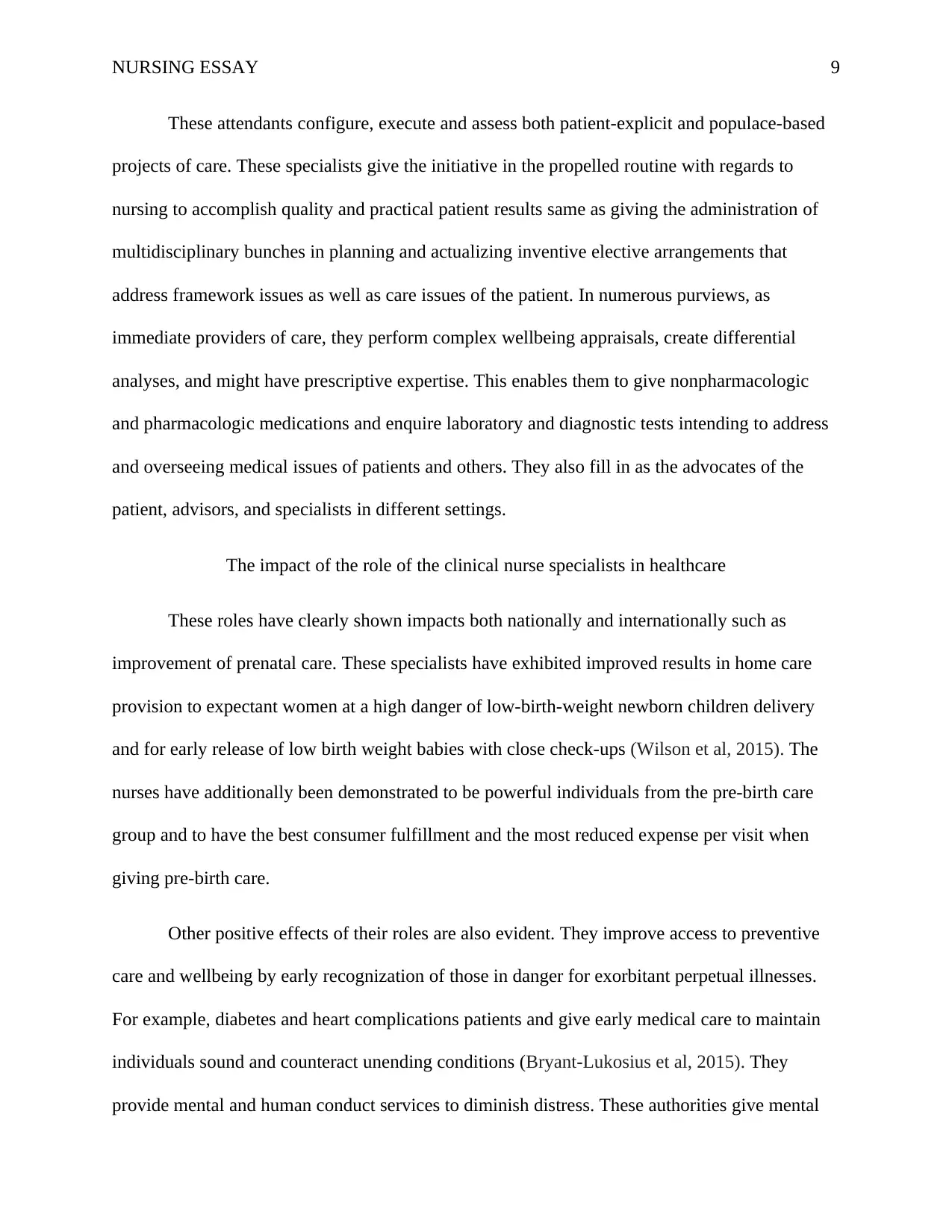
NURSING ESSAY 9
These attendants configure, execute and assess both patient-explicit and populace-based
projects of care. These specialists give the initiative in the propelled routine with regards to
nursing to accomplish quality and practical patient results same as giving the administration of
multidisciplinary bunches in planning and actualizing inventive elective arrangements that
address framework issues as well as care issues of the patient. In numerous purviews, as
immediate providers of care, they perform complex wellbeing appraisals, create differential
analyses, and might have prescriptive expertise. This enables them to give nonpharmacologic
and pharmacologic medications and enquire laboratory and diagnostic tests intending to address
and overseeing medical issues of patients and others. They also fill in as the advocates of the
patient, advisors, and specialists in different settings.
The impact of the role of the clinical nurse specialists in healthcare
These roles have clearly shown impacts both nationally and internationally such as
improvement of prenatal care. These specialists have exhibited improved results in home care
provision to expectant women at a high danger of low-birth-weight newborn children delivery
and for early release of low birth weight babies with close check-ups (Wilson et al, 2015). The
nurses have additionally been demonstrated to be powerful individuals from the pre-birth care
group and to have the best consumer fulfillment and the most reduced expense per visit when
giving pre-birth care.
Other positive effects of their roles are also evident. They improve access to preventive
care and wellbeing by early recognization of those in danger for exorbitant perpetual illnesses.
For example, diabetes and heart complications patients and give early medical care to maintain
individuals sound and counteract unending conditions (Bryant‐Lukosius et al, 2015). They
provide mental and human conduct services to diminish distress. These authorities give mental
These attendants configure, execute and assess both patient-explicit and populace-based
projects of care. These specialists give the initiative in the propelled routine with regards to
nursing to accomplish quality and practical patient results same as giving the administration of
multidisciplinary bunches in planning and actualizing inventive elective arrangements that
address framework issues as well as care issues of the patient. In numerous purviews, as
immediate providers of care, they perform complex wellbeing appraisals, create differential
analyses, and might have prescriptive expertise. This enables them to give nonpharmacologic
and pharmacologic medications and enquire laboratory and diagnostic tests intending to address
and overseeing medical issues of patients and others. They also fill in as the advocates of the
patient, advisors, and specialists in different settings.
The impact of the role of the clinical nurse specialists in healthcare
These roles have clearly shown impacts both nationally and internationally such as
improvement of prenatal care. These specialists have exhibited improved results in home care
provision to expectant women at a high danger of low-birth-weight newborn children delivery
and for early release of low birth weight babies with close check-ups (Wilson et al, 2015). The
nurses have additionally been demonstrated to be powerful individuals from the pre-birth care
group and to have the best consumer fulfillment and the most reduced expense per visit when
giving pre-birth care.
Other positive effects of their roles are also evident. They improve access to preventive
care and wellbeing by early recognization of those in danger for exorbitant perpetual illnesses.
For example, diabetes and heart complications patients and give early medical care to maintain
individuals sound and counteract unending conditions (Bryant‐Lukosius et al, 2015). They
provide mental and human conduct services to diminish distress. These authorities give mental
⊘ This is a preview!⊘
Do you want full access?
Subscribe today to unlock all pages.

Trusted by 1+ million students worldwide
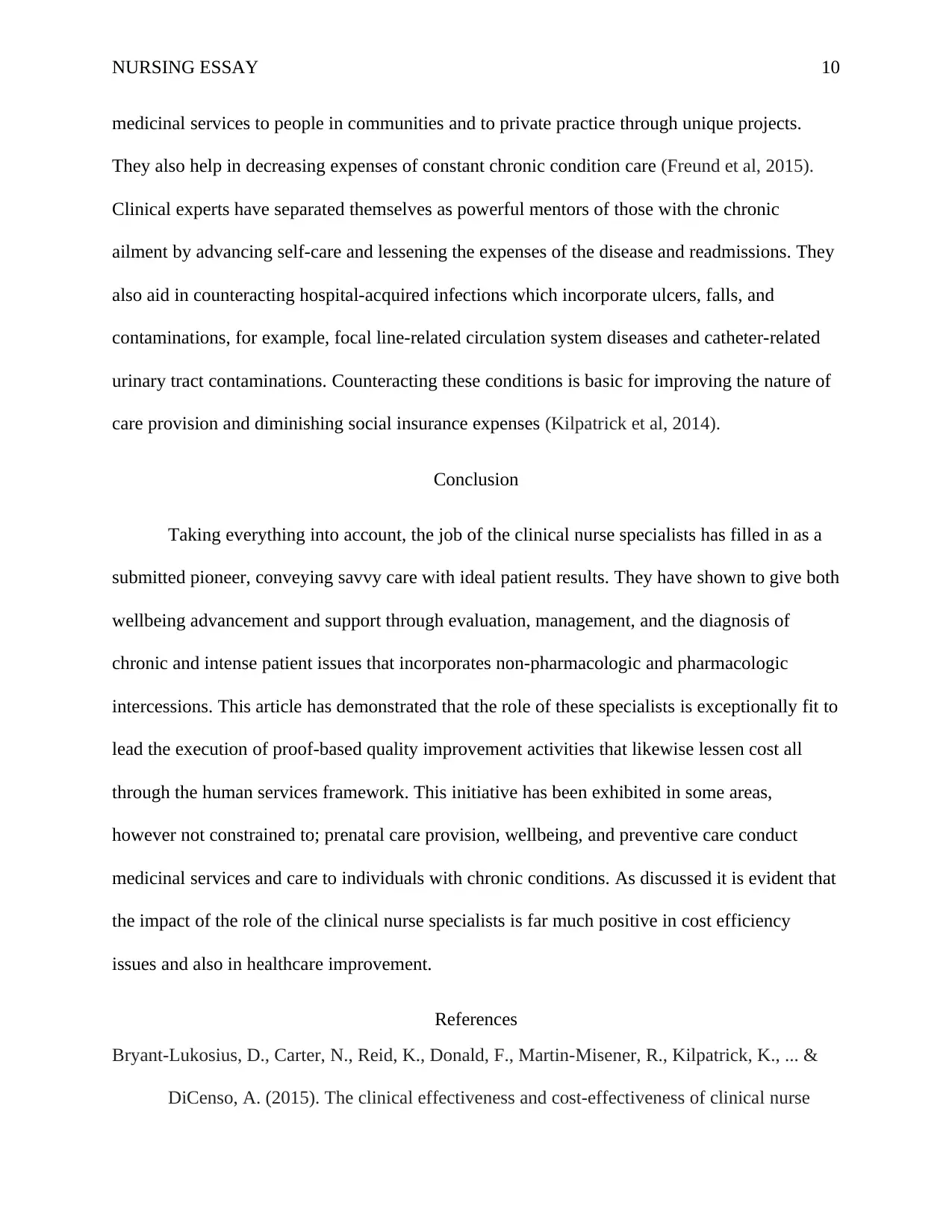
NURSING ESSAY 10
medicinal services to people in communities and to private practice through unique projects.
They also help in decreasing expenses of constant chronic condition care (Freund et al, 2015).
Clinical experts have separated themselves as powerful mentors of those with the chronic
ailment by advancing self-care and lessening the expenses of the disease and readmissions. They
also aid in counteracting hospital-acquired infections which incorporate ulcers, falls, and
contaminations, for example, focal line-related circulation system diseases and catheter-related
urinary tract contaminations. Counteracting these conditions is basic for improving the nature of
care provision and diminishing social insurance expenses (Kilpatrick et al, 2014).
Conclusion
Taking everything into account, the job of the clinical nurse specialists has filled in as a
submitted pioneer, conveying savvy care with ideal patient results. They have shown to give both
wellbeing advancement and support through evaluation, management, and the diagnosis of
chronic and intense patient issues that incorporates non-pharmacologic and pharmacologic
intercessions. This article has demonstrated that the role of these specialists is exceptionally fit to
lead the execution of proof-based quality improvement activities that likewise lessen cost all
through the human services framework. This initiative has been exhibited in some areas,
however not constrained to; prenatal care provision, wellbeing, and preventive care conduct
medicinal services and care to individuals with chronic conditions. As discussed it is evident that
the impact of the role of the clinical nurse specialists is far much positive in cost efficiency
issues and also in healthcare improvement.
References
Bryant‐Lukosius, D., Carter, N., Reid, K., Donald, F., Martin‐Misener, R., Kilpatrick, K., ... &
DiCenso, A. (2015). The clinical effectiveness and cost‐effectiveness of clinical nurse
medicinal services to people in communities and to private practice through unique projects.
They also help in decreasing expenses of constant chronic condition care (Freund et al, 2015).
Clinical experts have separated themselves as powerful mentors of those with the chronic
ailment by advancing self-care and lessening the expenses of the disease and readmissions. They
also aid in counteracting hospital-acquired infections which incorporate ulcers, falls, and
contaminations, for example, focal line-related circulation system diseases and catheter-related
urinary tract contaminations. Counteracting these conditions is basic for improving the nature of
care provision and diminishing social insurance expenses (Kilpatrick et al, 2014).
Conclusion
Taking everything into account, the job of the clinical nurse specialists has filled in as a
submitted pioneer, conveying savvy care with ideal patient results. They have shown to give both
wellbeing advancement and support through evaluation, management, and the diagnosis of
chronic and intense patient issues that incorporates non-pharmacologic and pharmacologic
intercessions. This article has demonstrated that the role of these specialists is exceptionally fit to
lead the execution of proof-based quality improvement activities that likewise lessen cost all
through the human services framework. This initiative has been exhibited in some areas,
however not constrained to; prenatal care provision, wellbeing, and preventive care conduct
medicinal services and care to individuals with chronic conditions. As discussed it is evident that
the impact of the role of the clinical nurse specialists is far much positive in cost efficiency
issues and also in healthcare improvement.
References
Bryant‐Lukosius, D., Carter, N., Reid, K., Donald, F., Martin‐Misener, R., Kilpatrick, K., ... &
DiCenso, A. (2015). The clinical effectiveness and cost‐effectiveness of clinical nurse
Paraphrase This Document
Need a fresh take? Get an instant paraphrase of this document with our AI Paraphraser
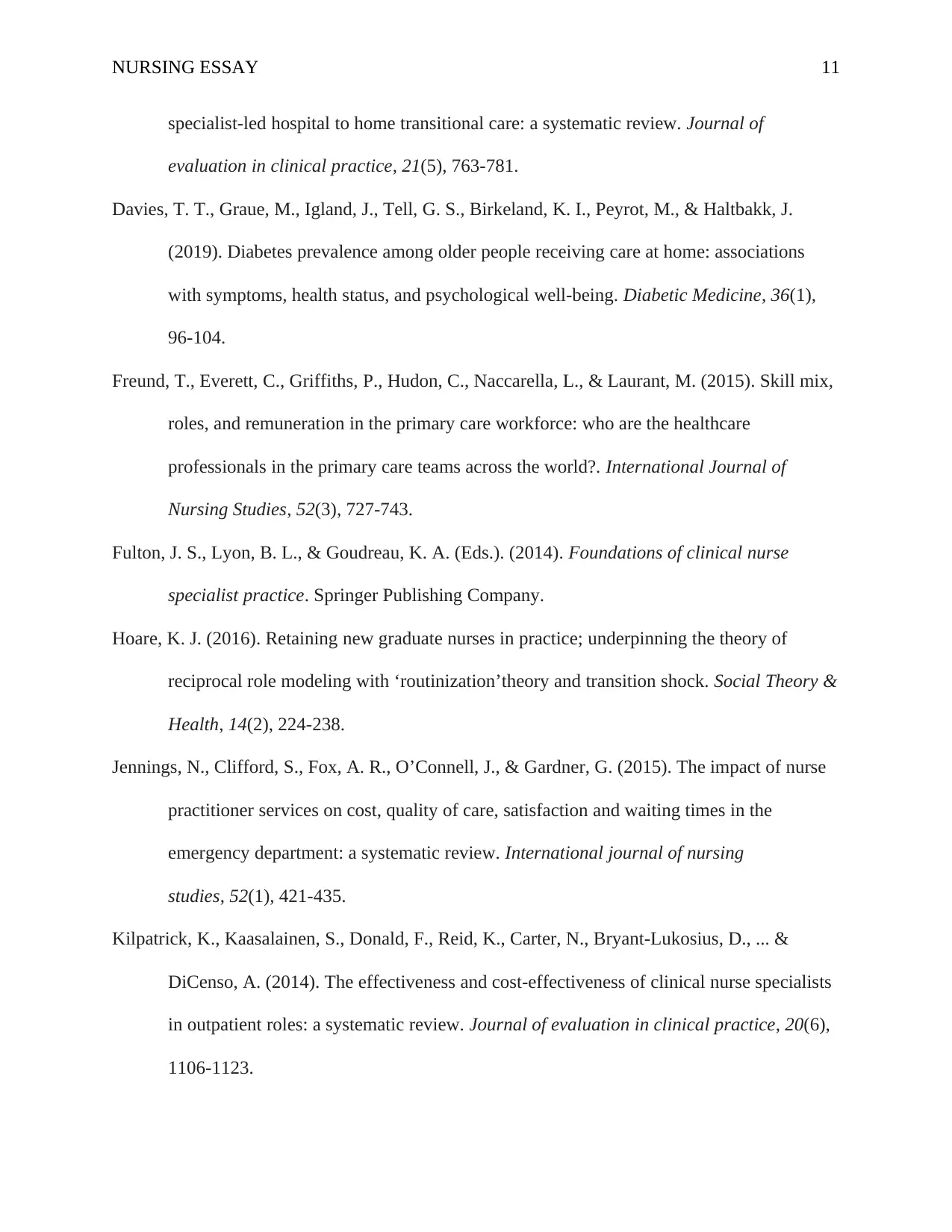
NURSING ESSAY 11
specialist‐led hospital to home transitional care: a systematic review. Journal of
evaluation in clinical practice, 21(5), 763-781.
Davies, T. T., Graue, M., Igland, J., Tell, G. S., Birkeland, K. I., Peyrot, M., & Haltbakk, J.
(2019). Diabetes prevalence among older people receiving care at home: associations
with symptoms, health status, and psychological well‐being. Diabetic Medicine, 36(1),
96-104.
Freund, T., Everett, C., Griffiths, P., Hudon, C., Naccarella, L., & Laurant, M. (2015). Skill mix,
roles, and remuneration in the primary care workforce: who are the healthcare
professionals in the primary care teams across the world?. International Journal of
Nursing Studies, 52(3), 727-743.
Fulton, J. S., Lyon, B. L., & Goudreau, K. A. (Eds.). (2014). Foundations of clinical nurse
specialist practice. Springer Publishing Company.
Hoare, K. J. (2016). Retaining new graduate nurses in practice; underpinning the theory of
reciprocal role modeling with ‘routinization’theory and transition shock. Social Theory &
Health, 14(2), 224-238.
Jennings, N., Clifford, S., Fox, A. R., O’Connell, J., & Gardner, G. (2015). The impact of nurse
practitioner services on cost, quality of care, satisfaction and waiting times in the
emergency department: a systematic review. International journal of nursing
studies, 52(1), 421-435.
Kilpatrick, K., Kaasalainen, S., Donald, F., Reid, K., Carter, N., Bryant‐Lukosius, D., ... &
DiCenso, A. (2014). The effectiveness and cost‐effectiveness of clinical nurse specialists
in outpatient roles: a systematic review. Journal of evaluation in clinical practice, 20(6),
1106-1123.
specialist‐led hospital to home transitional care: a systematic review. Journal of
evaluation in clinical practice, 21(5), 763-781.
Davies, T. T., Graue, M., Igland, J., Tell, G. S., Birkeland, K. I., Peyrot, M., & Haltbakk, J.
(2019). Diabetes prevalence among older people receiving care at home: associations
with symptoms, health status, and psychological well‐being. Diabetic Medicine, 36(1),
96-104.
Freund, T., Everett, C., Griffiths, P., Hudon, C., Naccarella, L., & Laurant, M. (2015). Skill mix,
roles, and remuneration in the primary care workforce: who are the healthcare
professionals in the primary care teams across the world?. International Journal of
Nursing Studies, 52(3), 727-743.
Fulton, J. S., Lyon, B. L., & Goudreau, K. A. (Eds.). (2014). Foundations of clinical nurse
specialist practice. Springer Publishing Company.
Hoare, K. J. (2016). Retaining new graduate nurses in practice; underpinning the theory of
reciprocal role modeling with ‘routinization’theory and transition shock. Social Theory &
Health, 14(2), 224-238.
Jennings, N., Clifford, S., Fox, A. R., O’Connell, J., & Gardner, G. (2015). The impact of nurse
practitioner services on cost, quality of care, satisfaction and waiting times in the
emergency department: a systematic review. International journal of nursing
studies, 52(1), 421-435.
Kilpatrick, K., Kaasalainen, S., Donald, F., Reid, K., Carter, N., Bryant‐Lukosius, D., ... &
DiCenso, A. (2014). The effectiveness and cost‐effectiveness of clinical nurse specialists
in outpatient roles: a systematic review. Journal of evaluation in clinical practice, 20(6),
1106-1123.
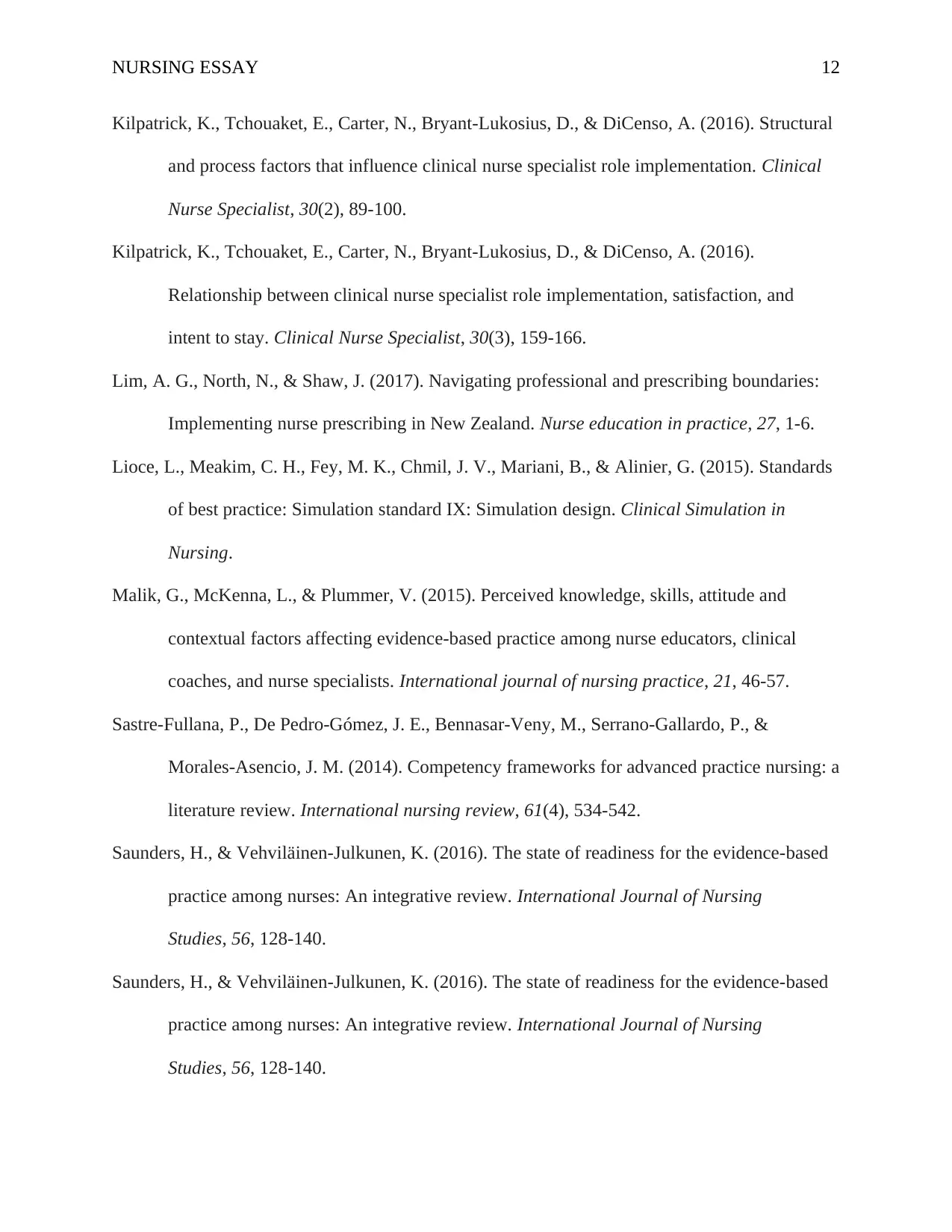
NURSING ESSAY 12
Kilpatrick, K., Tchouaket, E., Carter, N., Bryant-Lukosius, D., & DiCenso, A. (2016). Structural
and process factors that influence clinical nurse specialist role implementation. Clinical
Nurse Specialist, 30(2), 89-100.
Kilpatrick, K., Tchouaket, E., Carter, N., Bryant-Lukosius, D., & DiCenso, A. (2016).
Relationship between clinical nurse specialist role implementation, satisfaction, and
intent to stay. Clinical Nurse Specialist, 30(3), 159-166.
Lim, A. G., North, N., & Shaw, J. (2017). Navigating professional and prescribing boundaries:
Implementing nurse prescribing in New Zealand. Nurse education in practice, 27, 1-6.
Lioce, L., Meakim, C. H., Fey, M. K., Chmil, J. V., Mariani, B., & Alinier, G. (2015). Standards
of best practice: Simulation standard IX: Simulation design. Clinical Simulation in
Nursing.
Malik, G., McKenna, L., & Plummer, V. (2015). Perceived knowledge, skills, attitude and
contextual factors affecting evidence‐based practice among nurse educators, clinical
coaches, and nurse specialists. International journal of nursing practice, 21, 46-57.
Sastre‐Fullana, P., De Pedro‐Gómez, J. E., Bennasar‐Veny, M., Serrano‐Gallardo, P., &
Morales‐Asencio, J. M. (2014). Competency frameworks for advanced practice nursing: a
literature review. International nursing review, 61(4), 534-542.
Saunders, H., & Vehviläinen-Julkunen, K. (2016). The state of readiness for the evidence-based
practice among nurses: An integrative review. International Journal of Nursing
Studies, 56, 128-140.
Saunders, H., & Vehviläinen-Julkunen, K. (2016). The state of readiness for the evidence-based
practice among nurses: An integrative review. International Journal of Nursing
Studies, 56, 128-140.
Kilpatrick, K., Tchouaket, E., Carter, N., Bryant-Lukosius, D., & DiCenso, A. (2016). Structural
and process factors that influence clinical nurse specialist role implementation. Clinical
Nurse Specialist, 30(2), 89-100.
Kilpatrick, K., Tchouaket, E., Carter, N., Bryant-Lukosius, D., & DiCenso, A. (2016).
Relationship between clinical nurse specialist role implementation, satisfaction, and
intent to stay. Clinical Nurse Specialist, 30(3), 159-166.
Lim, A. G., North, N., & Shaw, J. (2017). Navigating professional and prescribing boundaries:
Implementing nurse prescribing in New Zealand. Nurse education in practice, 27, 1-6.
Lioce, L., Meakim, C. H., Fey, M. K., Chmil, J. V., Mariani, B., & Alinier, G. (2015). Standards
of best practice: Simulation standard IX: Simulation design. Clinical Simulation in
Nursing.
Malik, G., McKenna, L., & Plummer, V. (2015). Perceived knowledge, skills, attitude and
contextual factors affecting evidence‐based practice among nurse educators, clinical
coaches, and nurse specialists. International journal of nursing practice, 21, 46-57.
Sastre‐Fullana, P., De Pedro‐Gómez, J. E., Bennasar‐Veny, M., Serrano‐Gallardo, P., &
Morales‐Asencio, J. M. (2014). Competency frameworks for advanced practice nursing: a
literature review. International nursing review, 61(4), 534-542.
Saunders, H., & Vehviläinen-Julkunen, K. (2016). The state of readiness for the evidence-based
practice among nurses: An integrative review. International Journal of Nursing
Studies, 56, 128-140.
Saunders, H., & Vehviläinen-Julkunen, K. (2016). The state of readiness for the evidence-based
practice among nurses: An integrative review. International Journal of Nursing
Studies, 56, 128-140.
⊘ This is a preview!⊘
Do you want full access?
Subscribe today to unlock all pages.

Trusted by 1+ million students worldwide
1 out of 13
Related Documents
Your All-in-One AI-Powered Toolkit for Academic Success.
+13062052269
info@desklib.com
Available 24*7 on WhatsApp / Email
![[object Object]](/_next/static/media/star-bottom.7253800d.svg)
Unlock your academic potential
Copyright © 2020–2025 A2Z Services. All Rights Reserved. Developed and managed by ZUCOL.





